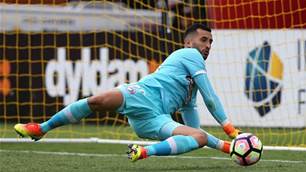Football Federation Australia bosses want A-League club owners to splash out on big name marquee stars to bring back fans and save the TV deal, chief executive David Gallop said today.
The A-League has been hit by plummeting TV ratings which has sent shockwaves through the sport ahead of the next TV deal.
While stadium crowds are only down very slightly year on year, viewing figures have slumped, jeopardising chances of renewing or improving the current near-$60m a year deal.
Gallop today insisted club investment in big name stars was an essential part of the A-League's future, harking back to the success of the 2012/3 season which saw Alessandro Del Piero, Shinjo Ono and Emile Heskey make it a landmark year for the A-League.
A new breakaway A-League structure will see the competition govern itself from next season, but Gallop stressed that meant the club owners had to invest heavily in its future to make it work.
"We want to encourage investment into the A-League, to make the A-League better, to make sure that it rates better, to get us better media rights," said Gallop today.
"This is the single most important thing that the game's got in front of it over the next few weeks.
"We've all seen the impact that big names can have but it has to be an environment where clubs feel comfortable to make that investment."
With the breakaway league – to be run by the club owners – hoping to retain up to 90 percent of the TV deal revenue, the FFA want the best possible TV deal so they can still fund other parts of the sport.
At a media briefing today, chairman Chris Nikou jokingly called the clubs "greedy bastards" over their claim to the lion's share of the TV deal.
But the FFA is concerned the deal raises enough to spread elsewhere to the parts of the game which can't fund themselves.
"There's a very important part of the equation which is that we make sure that what does not go in [the clubs'] direction is adequately funded into the future– meaning the national team program, community football programs, the FFA Cup – all the parts of the game that are not the A-League," Gallop said.
"No sport can prosper on the basis that the money goes where the money is generated. There are parts of the game which can't fund themselves."
As the board celebrates 100 days since taking the reins from the Lowy era, the FFA are keen to hail the work they have under way.
Two key working groups have been given wide remits to tackle burning issues in Australian football beyond establishing the new A-League structure, a second division and promotion and relegation.
Local club costs are a key part of it, said Nikou, with the aim of reducing sky-high players fees charged to help fund NPL first teams. Among the options being looked at is a renegotiation of transfer fees between NPL sides and A-League clubs which could replace the current standard $10,000 fee.
The national structure of the NPL and a second tier and its format are also all still on the table, and a replacement for the loathed National Club Identification Policy – which marginalised ethnic heritage clubs.
"The NCIP has been put to bed," vowed Nikou.
"Our job now is to distill a position that is more inclusive and allows the clubs that have been around for a long time and supported our sport to be proud of their history and their contribution."
The new regime's first 100 days has been overwhelmingly overshadowed by the sacking of Alen Stajcic and the subsequent fallout.
The board's deputy chair Heather Reid stood down from her role for personal reasons in the midst of the row after accusations direct messages on social media had been sent to a range of people by one director, spreading potentially defamatory innuendo about Stajcic's dismissal.
Nikou and Gallop both insisted the sacking was the right move, but conceded they may have handled things differently.
"It's a learning curve, isn't it," said Nikou. "As a board we have committed to certain media protocols - no Twitter. But you want to be as transparent as you can.
"There's no doubt there's been some teething problems, I'm not going to lie. But you move forward."
He added: "We made a decision that I'm comfortable with.
"Obviously it impacted a lot of people so the consternation was not intended. It was in the best interest of the Matildas.
"If we had more time, it might have been a different process but we had to make a call based on those recommendations."
Related Articles

Socceroo-in-waiting seals Championship deal

Fringe Socceroo swerves A-League to remain in Europe after Fulham exit














